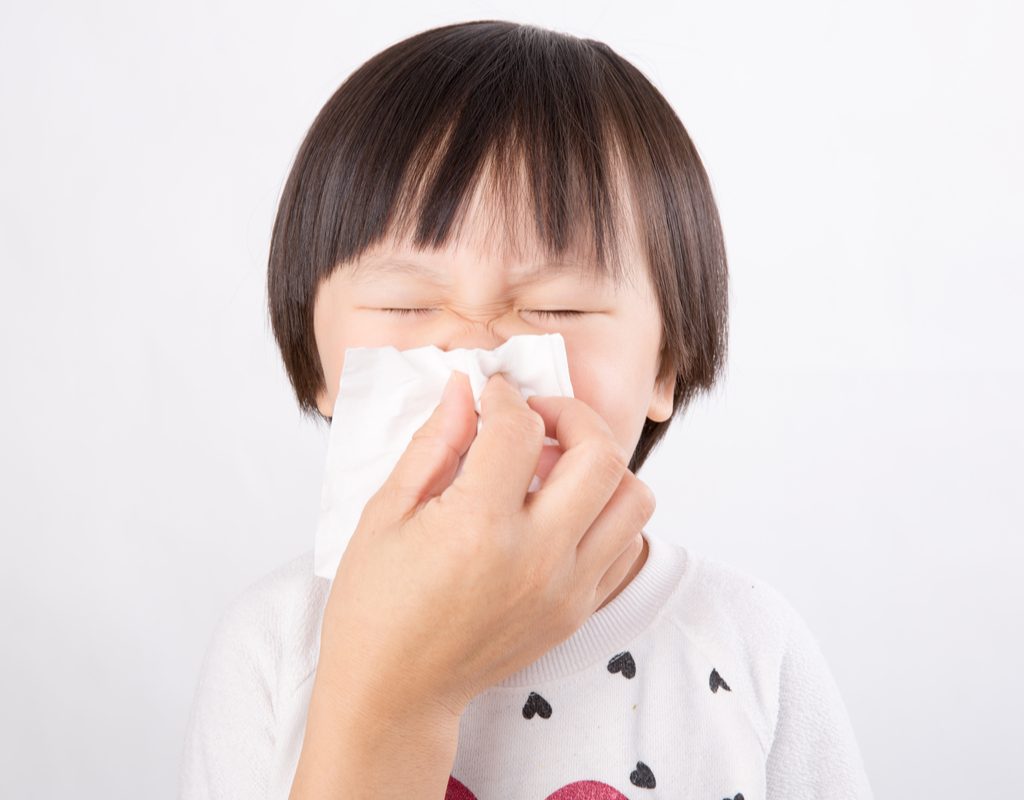Dealing with a toddler with a blocked nose is never fun. Toddlers tend to be magnets for germs, which can lead to those awful stuffy noses, meaning sleepless nights for everyone. If your toddler has a blocked nose at night, we know you both need relief. Fortunately, we can help you all get some sleep and help your little one breathe easier. We’ll explain home remedies for a toddler’s blocked nose and also when to worry about whether your little one can breathe while trying to sleep.
My toddler has a blocked nose at night: How can I help?

The best ways to deal with a stuffy nose take a bit longer, so deal with them during the day instead of waiting til the middle of the night. Prevention is key to not having to wake up in the middle of the night, though there are still remedies that work quickly if needed.
During the day and at bedtime, use steam as much as possible. Medical News Today suggests using steam to break up congestion before bedtime, at bedtime, and overnight. It loosens thick mucus and makes it easier for a child to breathe. In the case of nasal congestion, it will help the stuffiness run right out instead of being blocked up.
The way to get this steam to your child is to offer a warm, steamy bath at bedtime to break up the mucus before going to bed (of course, not too hot). Let your little one soak for a while and keep the bathroom door closed (with you inside to monitor) and maybe close the shower curtain as well to keep the steam in. (Don’t turn the bathroom fan on and start bedtime a little early to allow extra steaming time.) You can also sit with your child in the bathroom outside of the tub and let the shower run very hot (this time not with you or your child inside) and sit in the steamy room.
Overnight, to keep the steam going, use a cool mist humidifier in their bedroom. Keep the humidifier clean since mold can grow in damp places, and don’t leave your child alone with the humidifier within reach. Keeping your child well-hydrated also helps with a stuffy nose. All that water will thin out the mucus, and if the stuffed nose is coming from a cold or other illness, staying hydrated is also good practice for flushing out sickness and preventing dehydration.
How do I clear my toddler’s stuffy nose at night?

If these preventative measures haven’t helped and you’re stuck with a very stuffed-up toddler in the middle of the night and need quick remedies, here are a few things you can try.
- Saline nasal spray or drops. This is safe for toddlers since it is only salt water and not medicine. This can flush out congestion immediately to get back to sleep.
- Nose Frida. This device lets you suck out the congestion in an instant. Just like with saline, it may return, but you can both get back to bed for the time being.
- Bulb suction. If the Nose Frida grosses you out, try the traditional bulb suction associated with infant care to suck out the congestion.
Unfortunately, you can’t give toddlers medicine yet that will help with their congestion. Ask your pediatrician if there is anything else you can do for your child or if the stuffy nose has gone on for a long time and you are concerned.
What’s the best position for a congested child to sleep?

We know how frustrating it can be to watch your toddler try to sleep with a stuffy nose. The American Academy of Pediatrics warns that babies should always be placed on their backs on a firm, flat surface to sleep, but once you have a toddler, you have a few more options.
You can try to elevate your toddler’s head slightly while they sleep to help relieve their congestion. Use a rolled-up towel or sleeping wedge propped under the top of their mattress to help elevate their head while they sleep, allowing gravity to ease their congestion. This can help the mucus, causing their stuffy nose to drain better, allowing everyone to get some sleep.
Can a toddler suffocate from a stuffy nose?

Like adults, toddlers will generally breathe through their mouths when they can’t breathe through their noses. If you think your toddler’s lungs are compromised by the mucus, call the doctor. Otherwise, a blocked nose should not be a problem if your child’s mouth is clear, even if it is uncomfortable and not ideal for a few nights.
Mouth breathing is possible and OK temporarily, but only for the length of a typical cold. As always, if you are concerned about your child’s breathing, trust your gut and seek medical attention.
Why does my toddler’s nose get stuffy at night?

If you’ve noticed your toddler has developed a pattern where their nose only seems to get stuffy at night after an otherwise fairly uneventful day, you may be dealing with something more than a common cold. According to the experts at Pediatric ENT of Oklahoma, this could be caused by something as simple as seasonal allergies or something a bit more complex, like adenoids, a deviated septum, or a blocked airway. Always consult with your doctor if you notice anything unusual or if your child’s stuffy nose is persistent.
Seattle Children’s Hospital advises seeing a doctor right away if your child is still having trouble breathing after clearing out the nose. The experts there also advise contacting the doctor during office hours (but not an urgent visit) if a blocked nose is waking your child from sleep.





